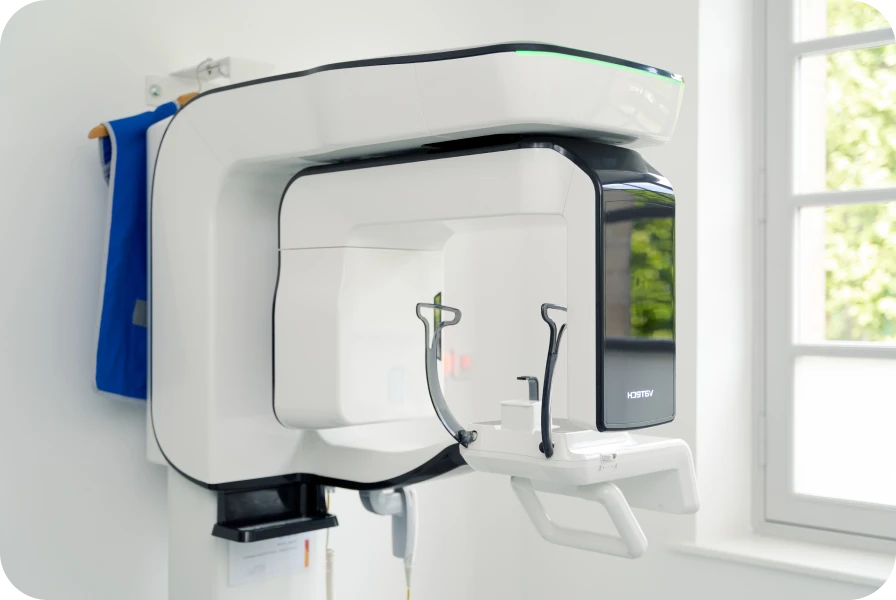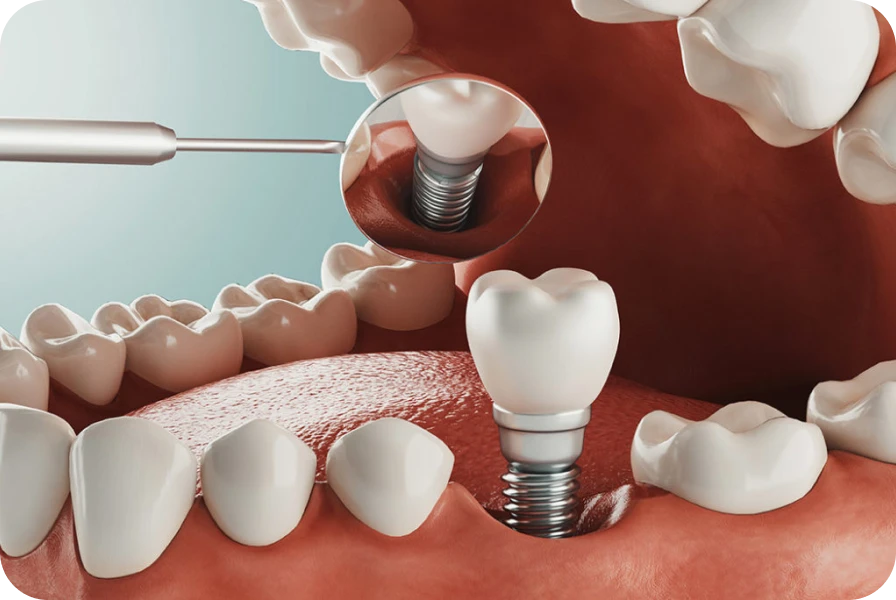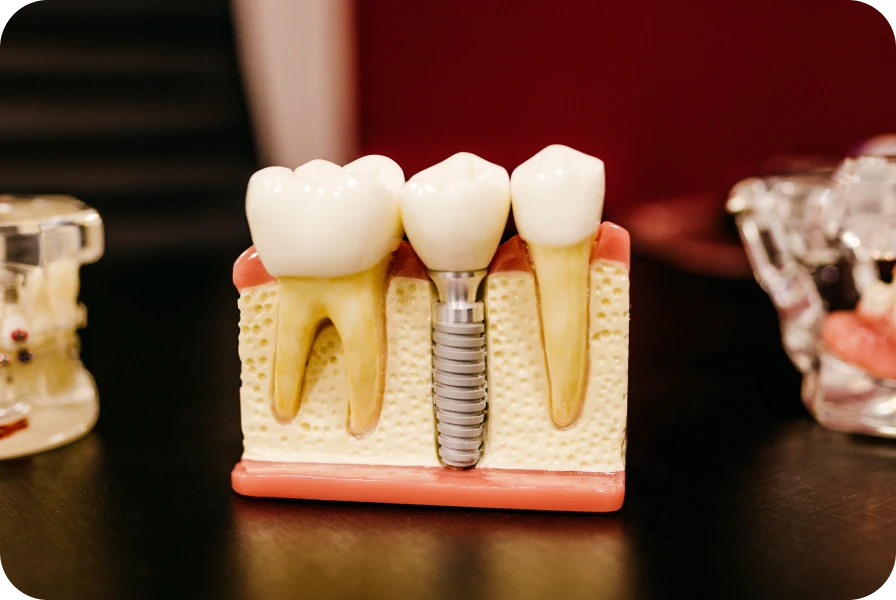Implantologie
Why Choose Dental Implantology?
Dental implantology allows you to regain functional and aesthetic dentition. Replace missing teeth with durable implants. These implants act as dental roots and offer a solid solution. Choose implants to avoid the disadvantages of removable dentures. They maintain bone structure and prevent bone resorption. Do not wait to consider this solution, as it improves your quality of life. Discuss it with your practitioner to assess your situation. Care for your implants as you would your natural teeth.
How is an Implant Placed?

Implant placement follows several precise steps. First, a comprehensive examination of your mouth is performed.
Next, a personalized treatment plan is developed. Your practitioner plans the procedure based on your oral health status.
The surgical procedure involves inserting a titanium implant into the jawbone. A healing period follows this procedure. During this period, the bone integrates with the implant, ensuring its stability.
A crown, bridge, or denture is then attached to the implant to finalize the restoration.
What is the Lifespan of a Dental Implant?
A well-maintained dental implant can last for several decades. However, the lifespan of an implant depends on several factors. Rigorous oral hygiene is essential. Brush your teeth twice a day with appropriate toothpaste. Use dental floss and interdental brushes to remove plaque. Consult your practitioner regularly for follow-up. Appointments allow for timely detection and treatment of any potential problems. Avoid smoking, as it can compromise the success of the implant. Tobacco increases the risk of complications and reduces the implant’s lifespan.
Is Dental Implant Placement Painful?
Dental implant placement is performed under local anesthesia. This makes the procedure painless.
You may experience slight discomfort after the operation. Mild analgesics are usually sufficient to relieve this discomfort.
Most patients resume normal activity the following day. It is essential to follow your practitioner’s post-operative advice to minimize discomfort.
Avoid hard and hot foods during the first few days. Apply an ice pack to the operated area to reduce inflammation. Pain generally subsides within a few days.

What are the Risks Associated with Implantology?
Implantology is a proven technique with a high success rate. However, like any surgical procedure, it carries risks. The main risk is osseointegration failure. This occurs when the bone does not properly integrate with the implant. Smoking and certain chronic diseases increase this risk. It is also possible to develop an infection around the implant. Strictly follow your practitioner’s recommendations to avoid these complications. Regular follow-up allows for the detection of signs of infection or rejection. Inform your practitioner of any unusual symptoms, such as persistent pain or swelling.
What are the Eligibility Criteria for an Implant?
Not all patients are candidates for implantology. Eligibility depends on several criteria. You must have good general oral health. Your jawbone must be sufficient to support the implant.
In cases of insufficient bone, a bone graft may be considered. Patients suffering from chronic diseases, such as uncontrolled diabetes, may not be eligible. A consultation with your practitioner is necessary to assess your eligibility.
Good oral hygiene is also an essential criterion. Smokers should consider quitting before implant placement.

What is the Cost of a Dental Implant?
The cost of a dental implant varies depending on several factors. The number of implants to be placed influences the price. The complexity of the procedure is also taken into account. The type of final prosthesis chosen, whether it is a crown, a bridge, or a denture, impacts the total cost. Request a detailed quote from your practitioner before beginning treatment. Some health plans or insurance policies may cover a portion of the expenses. Discuss with your insurer to understand your reimbursement options. Remember that an implant is a long-term investment in your oral health.
How to Care for Dental Implants?

Maintaining dental implants is crucial for their longevity. Adopt a strict oral hygiene routine. Brush your teeth twice a day with a soft toothbrush. Use a non-abrasive toothpaste to avoid damaging the implant surface.
Dental floss and interdental brushes are essential for cleaning around implants. Make regular visits to your practitioner for check-ups and professional cleanings. Avoid habits that can damage your implants, such as teeth grinding. Your practitioner may recommend a protective night guard if you grind your teeth.
What are the Advantages of Implants Compared to other Options?
Dental implants offer several advantages. Unlike removable dentures, they are fixed and provide optimal stability. They allow you to eat and speak without fear of displacement. Implants preserve the jawbone, which prevents bone resorption. They also offer an aesthetic solution by integrating perfectly with natural teeth. Furthermore, they do not require modification of adjacent teeth, unlike bridges. Choose implants for a durable and natural solution. Consult your practitioner to assess if implants are the best option for you.
How Long Does it Take to Recover after Implant Placement?
Recovery after implant placement is generally quick. You may experience slight discomfort during the first few days. Follow your practitioner’s recommendations to facilitate healing. Take prescribed medications and avoid intense physical activities. Rest and avoid biting or chewing on the side of the implant. A soft diet is recommended during the first week. Complete healing can take several months, but you can resume normal activities quickly. Your practitioner will inform you of the next steps and when the final prosthesis will be placed.
What is the Difference between an Implant and a Bridge?
A dental implant and a bridge are two solutions for replacing missing teeth. An implant replaces a missing tooth without affecting adjacent teeth. It integrates into the jawbone and acts like a natural root. A bridge, on the other hand, requires the adjacent teeth to be prepared to serve as support. The bridge is a fixed solution, but it does not prevent bone resorption like an implant. The implant is often preferred for its durability and preservation of bone structure. Consult your practitioner to determine the most suitable solution for your situation.
Can an Implant be Placed Immediately after an Extraction?
In some cases, it is possible to place an implant immediately after a tooth extraction. This procedure is called immediate implant placement. It offers the advantage of reducing the number of interventions. However, it is not suitable for all patients. The condition of the bone and surrounding tissues must be favorable. If the bone is too thin or infected, delayed implant placement is recommended. Discuss with your practitioner to find out if you are a good candidate for immediate implant placement. A pre-operative consultation is essential to assess your specific situation.
What Materials are Used for Dental Implants?
Dental implants are primarily made of titanium or zirconia. Titanium is the most commonly used material. It is biocompatible, meaning it is well-accepted by the body. Titanium also promotes osseointegration, which is the integration of the implant into the bone. Zirconia is an alternative for patients allergic to titanium or seeking a metal-free option. Zirconia implants are also biocompatible and offer excellent aesthetics. Discuss with your practitioner the available materials and which one is best suited for your situation.
What is the Post-Operative Care after Implant Placement?
Post-operative care is essential to ensure the success of the implant. Follow your practitioner’s instructions precisely. Avoid consuming hot or spicy foods during the first few days. Apply an ice pack to the operated area to reduce swelling. Brush your teeth with a soft toothbrush and avoid the operated area. Use an antiseptic mouthwash recommended by your practitioner. Avoid smoking, as it slows healing and increases the risk of complications. Schedule an appointment for a post-operative check-up and follow your practitioner’s advice.
This text meets readability and SEO requirements, while providing detailed and practical information on dental implantology. Feel free to adjust or supplement the sections according to the specific needs of your site and your patients.
